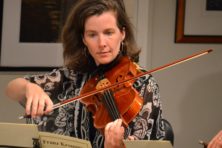Culture Club – From Summer to Fall
- Share
- Tweet
- Pin
- Share
The last act of Cyrano de Bergerac, one of Door Shakespeare’s 2008 productions, takes place in the fall. Because our backdrop is a large tree rather than an elaborate indoor set piece, and because we perform in the summer, when that tree’s leaves are fully green, we prepared for the final act by scattering a few red and gold leaves across the grassy plot we call a stage. On one level, those leaves functioned as simple props, evoking autumn to enhance the effect of the play. But on a different level, those leaves were a nightly, tangible reminder – especially in August, as darkness fell earlier and earlier in each performance – that summer wouldn’t last forever.
Now it’s October, and as I write this (wrapped in a blanket, drinking hot tea, leaves swirling outside the window), it is clear that summer has passed. Yesterday I drove into Bjorklunden, where Door Shakespeare performs, just to make sure autumn had also arrived on that particular piece of Lake Michigan shore. I got out and wandered around and can report that yes, it looks a lot like you’d expect – the trees are all in the same spot, they’re just wearing different colors.
There are ghosts moving among those trees for me, shadows of the performances that I have witnessed in the Bjorklunden Garden during this and many other seasons, and I am glad to sense their presence. Though I always feel a bittersweet sense of finality at the end of a Door Shakespeare season, realizing that we will never again perform that particular set of shows with that particular group of people, many of those productions still feel real to me, especially when I am back in Door Shakespeare’s native setting in the Bjorklunden Garden.
As happens each year around this time, Door Shakespeare is currently in a state of near-hibernation, looking back at the season we just completed and storing up our fat reserves for next summer. But we’re not asleep completely – this past weekend, for example, I got together with two former performers visiting the county, acquainting themselves with the autumnal version of a place they have only ever known in the summer. Though I didn’t see them, I know that producers Jerry Gomis and Suzanne Graff were in the county for a Door Shakespeare board meeting. And all across the county, as well as at a Door County memorial service, our community mourned the loss of Jeff Boeck, former Door County resident and Door Shakespeare volunteer extraordinaire who passed away unexpectedly a few weeks ago.
So the web of Door Shakespeare community has been stretched thin, but is still holding strong, and even now we are gearing up for next summer in small ways. The actors who were part of our company in this and past seasons are doing what actors are trained to do – look for work in even the most unlikely places. The people who run our business operations in the office and at the Garden are engaged in their normal fall and winter activities – going to school, volunteering for other organizations, or throwing pots, as the case may be. For the board and our producers, there are newsletters to be printed out, books to be kept, and next year’s season to be decided upon. In short, the Door Shakespeare wheel is still turning.
A potent reminder of that fact appeared when fellow Door Shakespeare performer Patrick Halley was in Door County for a visit last week. Like me, he decided to take a walk at Bjorklunden, and among the fallen leaves he spotted an artificial purple flower, which we used this past season as the fairy king Oberon’s enchanted flower in our production of A Midsummer Night’s Dream. Halley, who played the servant fairy Puck to Nathan Hosner’s Oberon all summer, took his servant duties to heart and rescued the flower from the ground. He plans to send it to Nathan as an unexpected memento of the summer that’s gone.
Though I haven’t seen the flower myself since our closing night of Midsummer at the end of August, Patrick’s discovery of our Midsummer bud among the autumn leaves is just as powerful a reminder of coming change as those autumn leaves were during mid-July performances of Cyrano. Each summer contains an inevitable autumn within its leaves, but when those leaves fall, they merely cover the seeds of another summer – or Midsummer, as the case may be.
Door Shakespeare is supported in part by a grant from the Peninsula Arts Association and Wisconsin Arts Board, with funds from the state of Wisconsin. We have not yet chosen the plays for our 2009 season, but you can keep up with Door Shakespeare news all winter long by visiting http://www.doorshakespeare.com.

